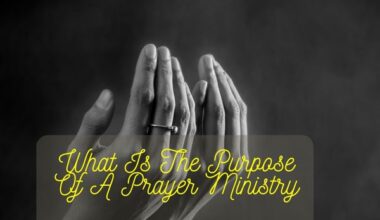During the holy hours of prayer, one could expect to feel connected to and rejuvenated spiritually. But it’s not unusual for people to encounter an unanticipated paradox after partaking in this intensely personal and frequently uplifting practice: a sense of depleted energy.
This phenomenon piques our interest and compels us to investigate the underlying causes of the seeming paradox between the spiritual goal of prayer and the sense of being drained of energy. It takes an in-depth understanding of the complex interactions between the emotional, psychological, and spiritual aspects of this profound human experience to comprehend why some people feel exhausted after prayer.
Why Do I Feel Drained After Praying
Prayer is often considered a source of spiritual nourishment and rejuvenation. However, many individuals experience an unexpected phenomenon – feeling drained after engaging in prayer. This article explores the intricate reasons behind this seemingly paradoxical experience, looking into the psychological and spiritual aspects of prayer, the energy dynamics involved, and practical techniques to overcome post-prayer fatigue.
Feeling drained after praying can have various explanations, and the reasons may vary from person to person. Here are a few possibilities:
1. Emotional Release
Prayer can be a deeply emotional experience, especially if you’re dealing with intense feelings, stress, or emotional issues. Expressing and confronting emotions during prayer may leave you feeling drained, similar to how you might feel after a therapeutic session.
2. Deep Reflection
Prayer often involves introspection and self-reflection. If you’re contemplating personal issues, moral dilemmas, or significant life decisions during your prayers, this deep level of thought and self-examination can be mentally taxing.
3. Spiritual Warfare
Some religious traditions speak of spiritual warfare, where individuals may feel a spiritual battle during prayer. The process of confronting negative energies or struggling with spiritual challenges can leave one feeling drained.
4. Physical Positioning
Depending on your religious tradition, praying may involve physical actions like kneeling, bowing, or standing for an extended period. These physical postures can contribute to physical fatigue.
5. Stress And Anxiety
If you’re praying about stressful situations or if prayer itself causes anxiety, the emotional toll can lead to feelings of exhaustion.
6. Over commitment
If you’re dedicating an excessive amount of time and energy to prayer, it might leave you physically and mentally drained. Balancing spiritual practices with other aspects of life is crucial for overall well-being.
7. Lack Of Sleep
If you pray during late hours or sacrifice sleep for prayer, it can contribute to feeling drained.
How To Overcome Being Drained After Praying
Feeling drained after praying can happen for various reasons, and addressing this issue may involve considering both physical and psychological factors. Here are some suggestions that might help you overcome feeling drained after prayer:
1. Hydration And Nutrition
Ensure that you are well-hydrated and have eaten properly before praying. Dehydration and low blood sugar can contribute to feelings of fatigue.
2. Physical Comfort
Make sure you are physically comfortable during prayer. Use a comfortable prayer mat or cushion, and choose a quiet, well-lit space.
3. Manage Your Expectations
Sometimes feeling drained can be linked to unrealistic expectations or self-imposed pressures related to prayer. Try to approach prayer with a sense of peace and without unnecessary stress.
4. Mindfulness And Relaxation Techniques
Incorporate mindfulness or relaxation techniques into your prayer routine. Deep breathing or meditation can help reduce stress and fatigue.
5. Moderation In Prayer
While long and intense prayers can be spiritually fulfilling, they can also be physically demanding. Find a balance that works for you, and don’t push yourself excessively.
6. Health Check
If you consistently feel drained after prayer, it might be worth checking with a healthcare professional to rule out any underlying health issues.
7. Vary Your Routine
If you follow a specific routine in your prayers, consider introducing some variety. Change the location, time, or the way you express your prayers to keep things fresh and engaging.
8. Prioritize Self-Care
Ensure that you are taking care of yourself outside of prayer. Adequate sleep, regular exercise, and a balanced diet contribute to overall well-being.
9. Connect With Others
Share your feelings with someone you trust. Sometimes, talking about your experiences can provide insights and support.
10. Seek Spiritual Guidance
If you’re comfortable, discuss your feelings with a spiritual leader or mentor. They may offer guidance on spiritual practices or provide insights into your specific situation.
11. Reflect On Intentions
Reflect on the intentions behind your prayers. Are you praying for inner peace, guidance, or forgiveness? Focusing on the purpose of your prayer can enhance its spiritual impact.
12. Set Realistic Goals
Set realistic expectations for your prayer sessions. It’s okay to have moments of silence and contemplation without the need for lengthy verbal prayers.
13. Take Breaks
If you’re feeling drained, it’s okay to take breaks during prayer. Quality matters more than quantity.
Tips For Rejuvenating After Prayer
Rejuvenating after prayer can be a personal and subjective experience, as it depends on individual preferences and beliefs. Here are some tips that may help you feel refreshed and rejuvenated after prayer:
1. Reflect On Your Prayer
Take a moment to reflect on the content and emotions of your prayer. Consider what you prayed for and how it aligns with your values and beliefs. Reflecting on your prayer can provide a sense of fulfilment and connection.
2. Express Gratitude
Cultivate a sense of gratitude for the opportunity to pray and for the things you have in your life. Focusing on positive aspects can contribute to a more positive and rejuvenating experience.
3. Deep Breathing
Engage in deep and mindful breathing exercises. Inhale slowly and deeply, hold your breath for a few seconds and exhale slowly. This can help calm the mind, reduce stress, and bring a sense of tranquillity.
4. Mindfulness Meditation
Consider incorporating mindfulness meditation into your post-prayer routine. This practice involves focusing your attention on the present moment, which can help you feel more centred and relaxed.
5. Engage In Physical Activity
Physical activity, such as a short walk or gentle stretching, can help release tension and boost your energy levels. It doesn’t have to be intense; even a brief, stroll can be rejuvenating.
6. Listen To Soothing Music
Choose calming and spiritual music that resonates with your beliefs. Listening to music can be a powerful way to shift your mood and create a peaceful atmosphere.
7. Read Inspirational Texts
Consider reading a passage from a sacred text, inspirational book, or poetry that aligns with your beliefs. Reflecting on meaningful words can provide a sense of peace and inspiration.
8. Connect With Nature
Spend time in nature, whether it’s in your backyard, a park, or a natural setting. The beauty of the outdoors can have a calming effect and help you feel more connected to the world around you.
9. Hydrate
Drink a glass of water to rehydrate your body. Dehydration can contribute to fatigue, so replenishing fluids is essential for maintaining your energy levels.
10. Practice Gratitude Journaling
Consider keeping a gratitude journal and jot down a few things you are thankful for. Focusing on positive aspects of your life can enhance your overall sense of well-being.
Conclusion
The feeling of being exhausted after prayer becomes a complex phenomenon that defies easy answers in the complex fabric of human emotions and spirituality. While some people find comfort and vigour in prayer, others could face difficulties that leave them feeling exhausted.
It is critical to acknowledge that each person’s experience of prayer is extremely personalized and influenced by their own set of circumstances, worldviews, and emotional environments. We can gain a deeper awareness of our spiritual practices and create the foundation for personal development and resilience in our pursuit of serenity and connection by recognizing and investigating these dynamics.






